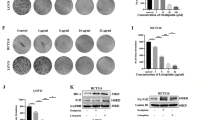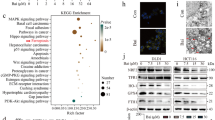Abstract
Colorectal cancer (CRC) is a prevalent malignancy affecting the human digestive tract. Triptonide has been shown to have some anticancer activity, but its effect in CRC is vague. Herein, we examined the effect of triptonide on CRC. In this study, the results of bioinformatics analysis displayed that triptonide may regulate ferroptosis in CRC by modulating GPX4 and SLC7A11. In HCT116 and LoVo cells, the expression levels of GPX4 and SLC7A11 were significantly reduced after triptonide management versus the control group. Triptonide inhibited proliferation, but promoted ferroptosis in CRC cells. SLC7A11 upregulation overturned the effects of triptonide on proliferation and ferroptosis in CRC cells. Triptonide inhibited activation of the PI3K/AKT/Nrf2 signaling in CRC cells. Activation of the PI3K/AKT signaling or Nrf2 upregulation overturned the effects of triptonide on proliferation and ferroptosis in CRC cells. Triptonide suppressed CRC cell growth in vivo by modulating SLC7A11 and GPX4. In conclusion, Triptonide repressed proliferation and facilitated ferroptosis of CRC cells by repressing the SLC7A11/GPX4 axis through inactivation of the PI3K/AKT/Nrf2 signaling.









Similar content being viewed by others
Data availability
The datasets used and/or analysed during the current study are available from the corresponding author on reasonable request.
References
Baidoun F, Elshiwy K, Elkeraie Y, Merjaneh Z, Khoudari G, Sarmini MT, Gad M, Al-Husseini M, Saad A (2021) Colorectal Cancer epidemiology: recent trends and Impact on outcomes. Curr Drug Targets 22:998–1009. https://doi.org/10.2174/1389450121999201117115717
Chang Z, Qin W, Zheng H, Schegg K, Han L, Liu X, Wang Y, Wang Z (2021) Triptonide is a reversible non-hormonal male contraceptive agent in mice and non-human primates. Nat Commun 12:1253. https://doi.org/10.1038/s41467-021-21517-5
Chen X, Li J, Kang R, Klionsky DJ, Tang D (2021) Ferroptosis: machinery and regulation. Autophagy 17:2054–2081. https://doi.org/10.1080/15548627.2020.1810918
Chen H, Qi Q, Wu N, Wang Y, Feng Q, Jin R, Jiang L (2022) Aspirin promotes RSL3-induced ferroptosis by suppressing mTOR/SREBP-1/SCD1-mediated lipogenesis in PIK3CA-mutant colorectal cancer. Redox Biol 55:102426. https://doi.org/10.1016/j.redox.2022.102426
Cheng Q, Chen M, Liu M, Chen X, Zhu L, Xu J, Xue J, Wu H, Du Y (2022) Semaphorin 5A suppresses ferroptosis through activation of PI3K-AKT-mTOR signaling in rheumatoid arthritis. Cell Death Dis 13:608. https://doi.org/10.1038/s41419-022-05065-4
Chinison J, Aguilar JS, Avalos A, Huang Y, Wang Z, Cameron DJ, Hao J (2016) Triptonide effectively inhibits Wnt/beta-Catenin signaling via C-terminal transactivation domain of beta-catenin. Sci Rep 6:32779. https://doi.org/10.1038/srep32779
Dong F, Yang P, Wang R, Sun W, Zhang Y, Wang A, Chen M, Chen L, Zhang C, Jiang M (2019) Triptonide acts as a novel antiprostate cancer agent mainly through inhibition of mTOR signaling pathway. Prostate 79:1284–1293. https://doi.org/10.1002/pros.23834
Fan A, Wang B, Wang X, Nie Y, Fan D, Zhao X, Lu Y (2021) Immunotherapy in colorectal cancer: current achievements and future perspective. Int J Biol Sci 17:3837–3849. https://doi.org/10.7150/ijbs.64077
Fu L, Niu X, Jin R, Xu F, Ding J, Zhang L, Huang Z (2020) Triptonide inhibits metastasis potential of thyroid cancer cells via astrocyte elevated gene-1. Translational cancer Res 9:1195–1204. https://doi.org/10.21037/tcr.2019.12.94
Gao B, Chen J, Han B, Zhang X, Hao J, Giuliano AE, Cui Y, Cui X (2021) Identification of triptonide as a therapeutic agent for triple negative breast cancer treatment. Sci Rep 11:2408. https://doi.org/10.1038/s41598-021-82128-0
Huang W, Chen K, Lu Y, Zhang D, Cheng Y, Li L, Huang W, He G, Liao H, Cai L, Tang Y, Zhao L, Pan M (2021) ABCC5 facilitates the acquired resistance of sorafenib through the inhibition of SLC7A11-induced ferroptosis in hepatocellular carcinoma. Neoplasia 23:1227–1239. https://doi.org/10.1016/j.neo.2021.11.002
Jiang X, Stockwell BR, Conrad M (2021) Ferroptosis: mechanisms, biology and role in disease. Nat Rev Mol Cell Biol 22:266–282. https://doi.org/10.1038/s41580-020-00324-8
Li Q, Peng F, Yan X, Chen Y, Zhou J, Wu S, Jiang W, Jin X, Liang J, Peng C, Pan X (2023) Inhibition of SLC7A11-GPX4 signal pathway is involved in aconitine-induced ferroptosis in vivo and in vitro. J Ethnopharmacol 303:116029. https://doi.org/10.1016/j.jep.2022.116029
Liu L, Yang S, Wang H (2021) Alpha-lipoic acid alleviates ferroptosis in the MPP(+) -induced PC12 cells via activating the PI3K/Akt/Nrf2 pathway. Cell Biol Int 45:422–431. https://doi.org/10.1002/cbin.11505
Liu XY, Wei DG, Li RS (2022a) Capsaicin induces ferroptosis of NSCLC by regulating SLC7A11/GPX4 signaling in vitro. Sci Rep 12:11996. https://doi.org/10.1038/s41598-022-16372-3
Liu X, Chen C, Han D, Zhou W, Cui Y, Tang X, Xiao C, Wang Y, Gao Y (2022b) SLC7A11/GPX4 inactivation-mediated ferroptosis contributes to the pathogenesis of Triptolide-Induced Cardiotoxicity. Oxid Med Cell Longev 2022(3192607). https://doi.org/10.1155/2022/3192607
Liu H, Zhang TA, Zhang WY, Huang SR, Hu Y, Sun J (2023) Rhein attenuates cerebral ischemia-reperfusion injury via inhibition of ferroptosis through NRF2/SLC7A11/GPX4 pathway. Exp Neurol 369:114541. https://doi.org/10.1016/j.expneurol.2023.114541
Mo X, Hu D, Yuan K, Luo J, Huang C, Xu M (2023) Tetrandrine citrate suppresses lung adenocarcinoma growth via SLC7A11/GPX4-mediated ferroptosis. Discov Oncol 14:85. https://doi.org/10.1007/s12672-023-00691-6
Piawah S, Venook AP (2019) Targeted therapy for colorectal cancer metastases: a review of current methods of molecularly targeted therapy and the use of tumor biomarkers in the treatment of metastatic colorectal cancer. Cancer 125:4139–4147. https://doi.org/10.1002/cncr.32163
Shin AE, Giancotti FG, Rustgi AK (2023) Metastatic colorectal cancer: mechanisms and emerging therapeutics. Trends Pharmacol Sci 44:222–236. https://doi.org/10.1016/j.tips.2023.01.003
Sun S, Guo C, Gao T, Ma D, Su X, Pang Q, Zhang R (2022) Hypoxia enhances Glioma Resistance to Sulfasalazine-Induced ferroptosis by upregulating SLC7A11 via PI3K/AKT/HIF-1alpha Axis. Oxid Med Cell Longev 2022(7862430). https://doi.org/10.1155/2022/7862430
Thanikachalam K, Khan G (2019) Colorectal Cancer and Nutrition. Nutrients 11. https://doi.org/10.3390/nu11010164
Wang Y, Zhang Z, Sun W, Zhang J, Xu Q, Zhou X, Mao L (2022a) Ferroptosis in colorectal cancer: potential mechanisms and effective therapeutic targets. Biomed Pharmacother 153:113524. https://doi.org/10.1016/j.biopha.2022.113524
Wang Y, Shen Z, Zhao S, Huang D, Wang X, Wu Y, Pei C, Shi S, Jia N, He Y, Wang Z (2022b) Sipeimine ameliorates PM2.5-induced lung injury by inhibiting ferroptosis via the PI3K/Akt/Nrf2 pathway: a network pharmacology approach. Ecotoxicol Environ Saf 239:113615. https://doi.org/10.1016/j.ecoenv.2022.113615
Wei R, Zhao Y, Wang J, Yang X, Li S, Wang Y, Yang X, Fei J, Hao X, Zhao Y, Gui L, Ding X (2021) Tagitinin C induces ferroptosis through PERK-Nrf2-HO-1 signaling pathway in colorectal cancer cells. Int J Biol Sci 17:2703–2717. https://doi.org/10.7150/ijbs.59404
Yan H, Talty R, Aladelokun O, Bosenberg M, Johnson CH (2023a) Ferroptosis in colorectal cancer: a future target? Br J Cancer 128:1439–1451. https://doi.org/10.1038/s41416-023-02149-6
Yan H, Talty R, Johnson CH (2023b) Targeting ferroptosis to treat colorectal cancer. Trends Cell Biol 33:185–188. https://doi.org/10.1016/j.tcb.2022.11.003
Yang A, Qin S, Schulte BA, Ethier SP, Tew KD, Wang GY (2017) MYC inhibition depletes Cancer stem-like cells in Triple-negative breast Cancer. Cancer Res 77:6641–6650. https://doi.org/10.1158/0008-5472.CAN-16-3452
Yi J, Zhu J, Wu J, Thompson CB, Jiang X (2020) Oncogenic activation of PI3K-AKT-mTOR signaling suppresses ferroptosis via SREBP-mediated lipogenesis. Proc Natl Acad Sci U S A 117:31189–31197. https://doi.org/10.1073/pnas.2017152117
Zhang M, Tan S, Yu D, Zhao Z, Zhang B, Zhang P, Lv C, Zhou Q, Cao Z (2019) Triptonide inhibits lung cancer cell tumorigenicity by selectively attenuating the Shh-Gli1 signaling pathway. Toxicol Appl Pharmacol 365:1–8. https://doi.org/10.1016/j.taap.2019.01.002
Zhang M, Meng M, Liu Y, Qi J, Zhao Z, Qiao Y, Hu Y, Lu W, Zhou Z, Xu P, Zhou Q (2021) Triptonide effectively inhibits triple-negative breast cancer metastasis through concurrent degradation of Twist1 and Notch1 oncoproteins. Breast Cancer Res 23:116. https://doi.org/10.1186/s13058-021-01488-7
Zhang H, Mao Y, Zou X, Niu J, Jiang J, Chen X, Zhu M, Yang X, Dong T (2023) Triptonide inhibits growth and metastasis in HCC by suppressing EGFR/PI3K/AKT signaling. Neoplasma 70:94–102. https://doi.org/10.4149/neo_2022_221118N1112
Zhao X, Gao M, Liang J, Chen Y, Wang Y, Wang Y, Xiao Y, Zhao Z, Wan X, Jiang M, Luo X, Wang F, Sun X (2021) SLC7A11 reduces Laser-Induced Choroidal neovascularization by inhibiting RPE ferroptosis and VEGF production. Front Cell Dev Biol 9:639851. https://doi.org/10.3389/fcell.2021.639851
Acknowledgements
Not applicable.
Funding
This study was funded by the Natural Science Foundation of Ningxia (No. 2022AAC03571).
Author information
Authors and Affiliations
Contributions
Hai Li designed the study. Weijie Wang and Xiaofen Zhao performed the experiments. Jie Zhou analyzed the data. Weijie Wang wrote the manuscript. All authors have read and approved the final manuscript.
Corresponding author
Ethics declarations
Ethics approval and consent to participate
This study was approved by an institutional review board of General Hospital of Ningxia Medical University.
Consent for publication
Not applicable.
Competing interests
The authors declare no competing interests.
Additional information
Publisher’s Note
Springer Nature remains neutral with regard to jurisdictional claims in published maps and institutional affiliations.
Rights and permissions
Springer Nature or its licensor (e.g. a society or other partner) holds exclusive rights to this article under a publishing agreement with the author(s) or other rightsholder(s); author self-archiving of the accepted manuscript version of this article is solely governed by the terms of such publishing agreement and applicable law.
About this article
Cite this article
Wang, W., Zhao, X., Zhou, J. et al. A novel antitumor mechanism of triptonide in colorectal cancer: inducing ferroptosis via the SLC7A11/GPX4 axis. Funct Integr Genomics 24, 126 (2024). https://doi.org/10.1007/s10142-024-01402-2
Received:
Revised:
Accepted:
Published:
DOI: https://doi.org/10.1007/s10142-024-01402-2




